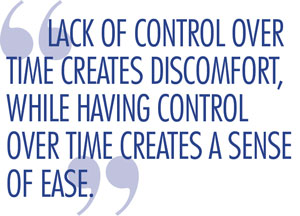Construction contractors face it frequently—that hollow feeling in the gut that there isn’t enough time. The clock ticks faster on construction projects; slower when getting a cavity filled at the dentist—just the facts of life.
Time is money to owners, contractors, and users of the project. From the owner’s perspective, revenue is lost by not receiving a return on an investment, cash flow crunch, potential alienation and loss of clients/tenants, extended interest payments, and negative marketing impacts. From the users’ perspective, there are financial implications similar to owners. Delays in upgraded facilities translate into operating at below optimum efficiency, resulting in higher user cost. Delays in constructing or rehabilitating infrastructure negatively affect businesses and the public at-large. Time implications from the contractor’s perspective include potential liquidated damages (negative) and incentive/disincentive payments. Delays result in extended overhead costs and put a crunch on critical cash flow. Extending project durations limit the contractor’s bonding capacity and ability to bid more work (lost opportunity cost). Inefficient time management results in higher labor and equipment costs. A reputation for late completions is bad for business, especially in negotiated work.

In today’s intensely time-driven business environment, superior planning, scheduling, and control are vital. All the time issues swirl around control. Lack of control over time creates discomfort, while having control over time creates a sense of ease.
Here are tips, tactics, and devices that will help the contractor have control over time:
- Notebook and pen: A no-batteries or power-cord required paper notebook can be a lifesaver. What it lacks in snazziness, it makes up for in functionality and flexibility. Date each page and use the notebook for anything and everything. Make “to do” lists, documentations, notes, ideas, time records, mileage and expenses, names and phone numbers, and/or reminders. There are no rules. It can be a junk drawer for odds and ends or a disciplined, sorted method for recording Completed Tasks, To Dos, and Plans. The notebook can function as a diary of what took place on any day or an intermediary capture that is later transferred to a computer, tablet, or smartphone. Any style notebook will do. The tape-bound, black-marble composition notebooks are especially inexpensive and work well.
- iPhone/smartphone: Today’s smartphones, which are all pretty much based on the innovative Apple iPhone, can function like the Swiss Army knife of time management. The three forms of communication—telephone, text, and email—all show a time-date record, which can be helpful. There’s a camera and video camera capability for documenting completed tasks, projects, or issues. A tape recorder, reminder alarms, clock, calendar, weather report, and countless helpful apps, which are free or can be purchased.
Three helpful apps for construction contractors hoping to tame the time beast are:
- Toggl: Say what’s to be done, start the timer, and stop it when done. Events can be coded to see what is consuming more time than it should.
- My Minutes: The focus is on goal setting. Schedule an activity and the amount of time it should take. The app gives a nudge when out of time or a virtual pat on the back when the goal is hit.
- Construction Manager: Allows the transfer of maintenance logs, daily reports, project estimates, and time sheets. Salespeople and estimators can create on-site estimates for construction and repair projects.
LEARN TO SAY NO
Most people are agreeable chumps. Ask and they’ll make time to do it. These “it will only take a few minutes” tasks, discussions, or meetings can easily bollix up the golden rule of time management, which is that for each day one needs to identify the two or three tasks that are the most crucial and do those first. Once those are done, the day has already been a success. It is critical to exercise the prerogative to say no.
Jane Collingwood with Psych Central, an online mental health resource, offers these “Top Tips for Saying No:”
- Keep your response simple; if you want to say no, be firm and direct.
- Buy yourself some time.
- Consider a compromise.
- Separate refusal from rejection.
- Don’t feel guilty for saying no.Be true to yourself.
Time is a force. It is relentless, untiring, and never stops. For the construction contractor, the best that can be done is to control it and manage it. ■
About the Author: Jeff Winke is a business and construction writer based in Milwaukee, Wisconsin. His portfolio can be seen at jeffwinke.contently.com.
_________________________________________________________________________
Modern Contractor Solutions – January 2016
Did you enjoy this article?
Subscribe to the FREE Digital Edition of Modern Contractor Solutions magazine.



